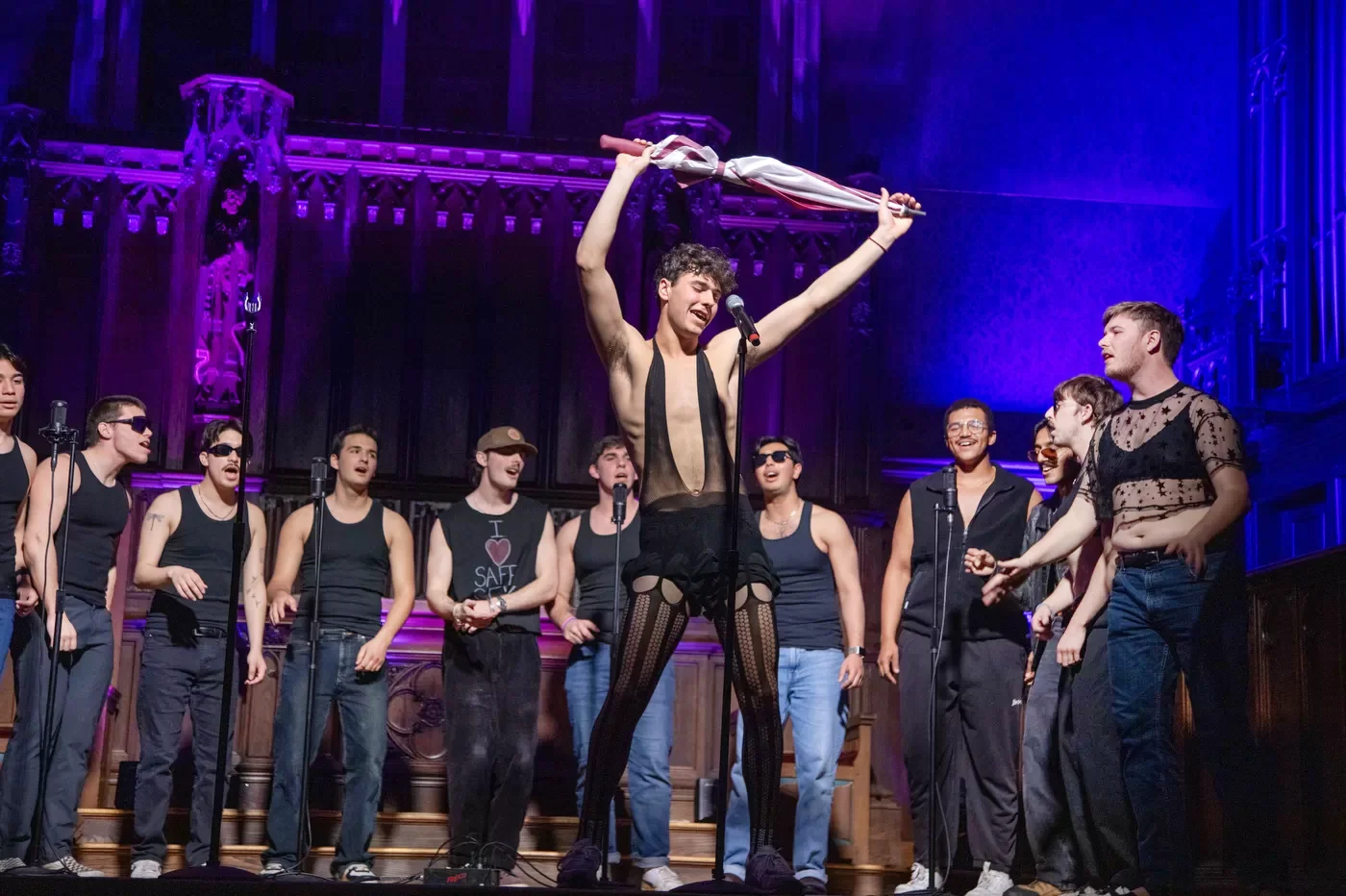
A new garden providing fresh produce to Dining Services.
Further reductions in the amount of food scraps and other waste, including an eye-popping amount of paper towels, that Bates sends to the landfill.
More efficient water usage in Merrill Gym — and easier access to drinking water in Carnegie Science Hall.
See the eight sustainability projects being funded this year by Green Innovation Grants.
Proposed by students, staff, and faculty, these are some of the sustainability projects that Bates’ Green Innovation Grant program is supporting this year. Eight awards, some as large as $2,000, were approved late last semester to fund the campus initiatives.
“We want to reward folks for being innovative and impactful. Those are the criteria that we’re most looking for,” says Tom Twist, GIG administrator and the college’s sustainability manager.
Vetted by the steering committee of Bates’ Committee on Environmental Responsibility, the grants not only boost green practices on campus, but, as Twist says, “help students in particular, but also staff and faculty, feel ownership of sustainability on campus.”
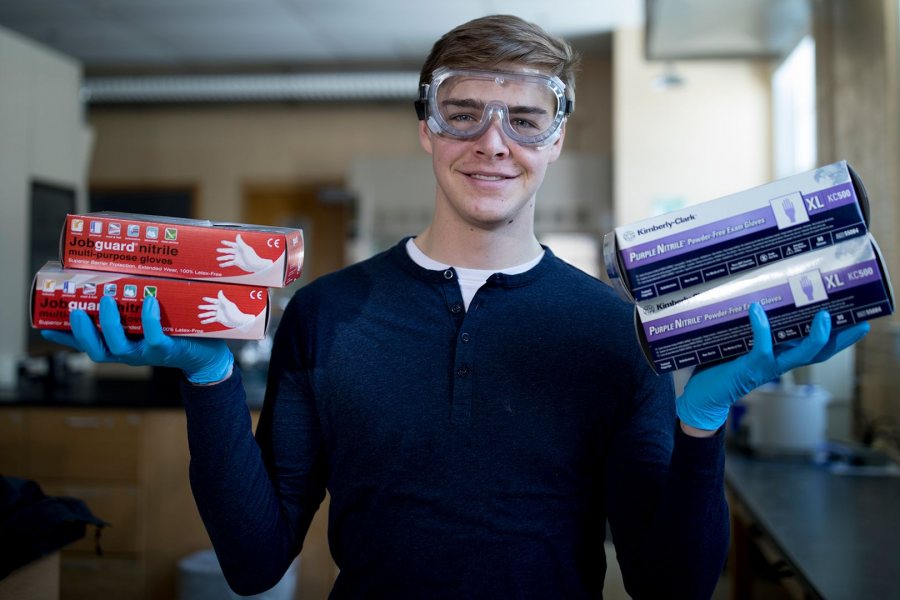
Jake O’Hara ’21 of Milford, Conn., is one of a team of students who received a Green Innovation Grant to recycle gloves used in science labs. (Phyllis Graber Jensen/Bates College)
Now in its second year, the GIG program came barreling out of the gate in 2016–17 with proposals that included a reusable mug program that has eliminated the 750,000 disposable paper cups that used to pass through Commons every year.
Among the current crop of GIG projects, the proposal from Nell Houde ’18 of Meriden, N.H., for a new vegetable garden may be the most uplifting. Houde, who is partnering with Dining Services, received a $1,885 GIG that will pay for tools, seeds, and other startup supplies. (Dining Services has run an herb garden adjacent to Commons for some years.)
Occupying about a quarter-acre of a plot near campus, the garden will present “a sustainable model of food production,” albeit on a small scale, says Houde. In addition to annual vegetables, the plot will likely support fruit trees and other perennials. “We will definitely be practicing-organic!” Houde says.
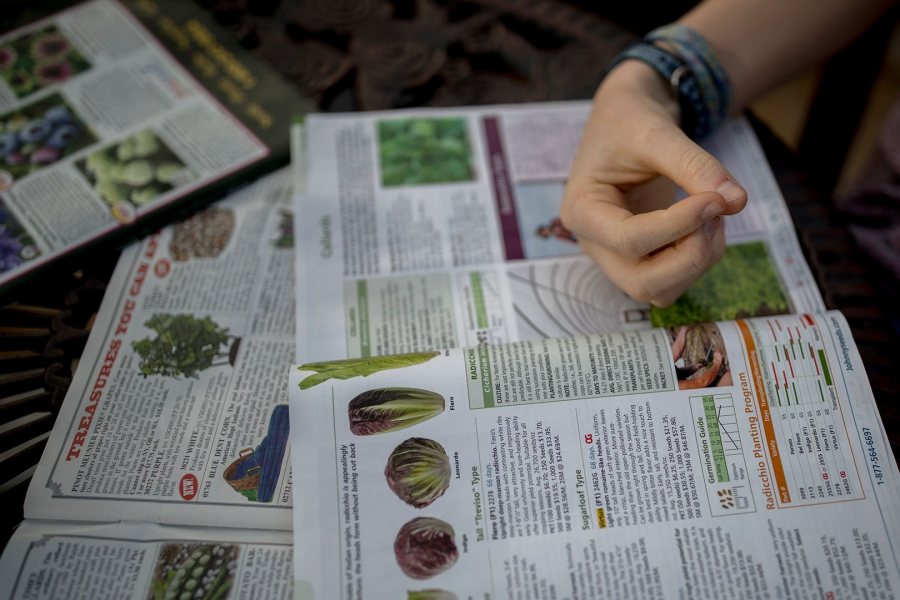
A Green Innovation Grant awarded to Nell Houde ’18 will be used to start a garden that will supply vegetables to Dining Services. (Phyllis Graber Jensen/Bates College)
Dining Services will not only reimburse the garden program for produce but pay for summer interns to work the plot. During the school year, Bates EcoReps, members of the college’s student sustainability corps, will work the garden. “Farming happens best when there’s a community of people invested in it,” says Houde, whose experience includes a stint with the local Lots to Gardens urban agriculture program.
As in the first round of GIG funding, the new awards emphasize waste reduction through varied means — composting, recycling, and directing consumer habits away from single-use products.
Also like last year’s, some current projects will result from collaborations among people who individually proposed projects that have overlapping goals. This year’s eight grants, in fact, are responses to 12 group or individual applications.
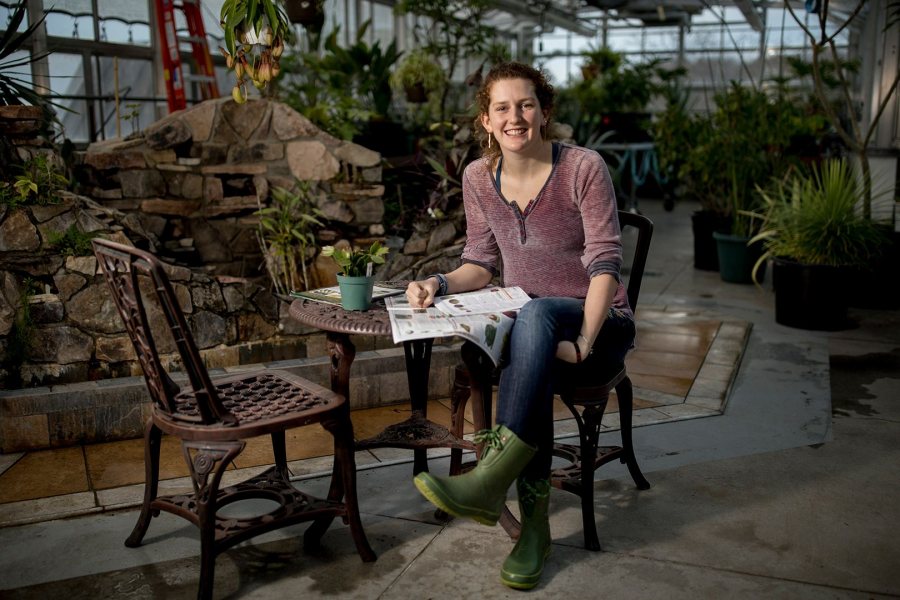
The Maine firm Johnny’s Selected Seeds is one of the suppliers Nell Houde ’18, pictured in a college greenhouse, will use for the new Bates garden she’s planning. (Phyllis Graber Jensen/Bates College)
Last year, for example, several proposals addressed that goal of eliminating paper cups. But instead of cherrypicking one or two proposals, the committee asked all applicants with a paper-cup proposal to collaborate on devising a single solution — which, in the event, was to give every student a so-called personal reusable container as a substitute for paper.
With campus-wide compost collection now in its second year, four of the current GIG proposals aim to increase campus composting of food waste (as well as paper towels, which can be composted in limited quantities).
“So we’re doing something similar to last year,” Twist says. “We gave the compost goal $2,000, and we’re arranging for all of those folks” — students and Advancement staff, in this case — “to meet and sort out their ideas.” Composting on campus has “a lot of moving parts, and so the more people thinking and talking about it, the better.”
“Being innovative and impactful — those are the criteria that we’re most looking for.”
The individual compost-themed proposals ranged from simply increasing the number of compost receptacles on campus to hiring a student, equipped with an adult tricycle, to bring compost bins to a central pickup location for Bates’ composting company, We Compost It! of Auburn. “That would save us a lot of money,” says Twist.
Other winning GIGs aimed at waste-reduction? On behalf of the Bates Chemical Society, Nathanael Kuzio ’19 of Moretown, Vt., received $600 to implement a system in Dana Chemistry Hall for recycling used nitrile gloves. The society has engaged TerraCycle of Trenton, N.J., which specializes in processing such hard-to-recycle products as pens, chip bags, and cigarette butts.
Similarly, Bates’ Admission office uses a Keurig machine to brew beverages for the many prospective students and families who visit. One result of this hospitality is a mess of K-Cups going into the waste stream, something that has caught the attention of visitors.
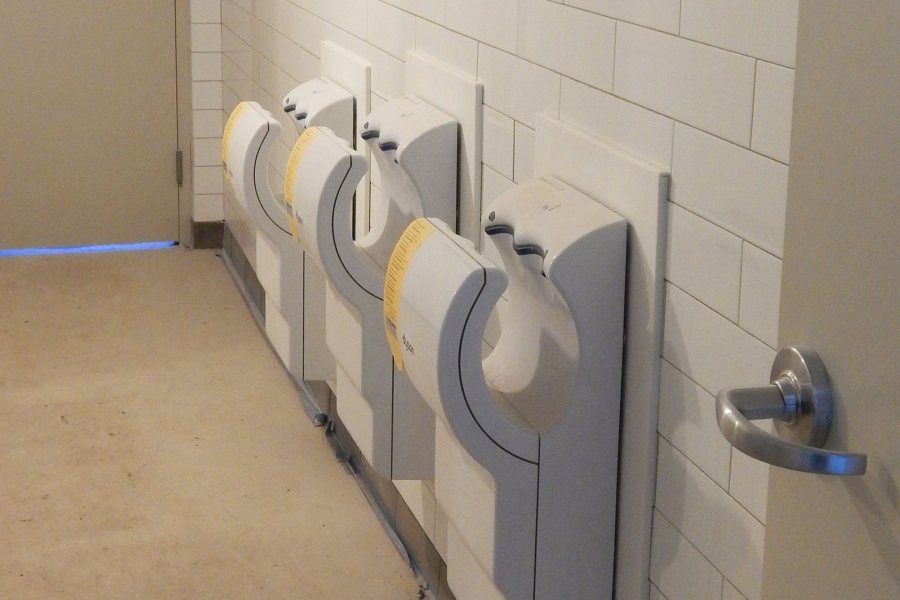
Some Bates dormitories will soon sport new resource-conserving hand dryers like these Dyson Airblades in Kalperis Hall. (Doug Hubley/Bates College)
So Sherry St. Amant, Admission office manager and assistant to the dean, won a $400 GIG to enroll in Keurig Green Mountain’s Grounds to Grow On program, which sells bins for collecting and returning spent K-Cups to the manufacturer. “Grounds to Grow On separates the coffee or tea grounds from the cups,” St. Amant explains. “The grounds are composted and the pods are used to produce energy.”
While some GIG recipients are pondering how to gather used restroom paper towels for recycling, another seeks to boot the towels altogether. Olivia LaMarche ’20 of Lynnfield, Mass., and Adair Andre ’18 of Edina, Minn., submitted separate proposals for expanding Bates’ complement of high-speed electric hand dryers in one or more dorms.
LaMarche points out that Bates, every year, runs through about 750 cases of paper towel rolls and 110 cases of folded, single-sheet towels — all told, about four million feet linear feet of towels. “Our recycling facility, Casella Waste Systems, no longer accepts paper towels because they are too expensive to recycle in large quantities, so the majority of them are sent to the Lewiston landfill,” she says.
High-speed dryers like the Dyson Airblades that Bates already uses in a few buildings “are without a doubt more energy-efficient and cost-effective in the long term,” Andre says. But they’re expensive up front: LaMarche and Andre’s final project will likely result in only three new installations.
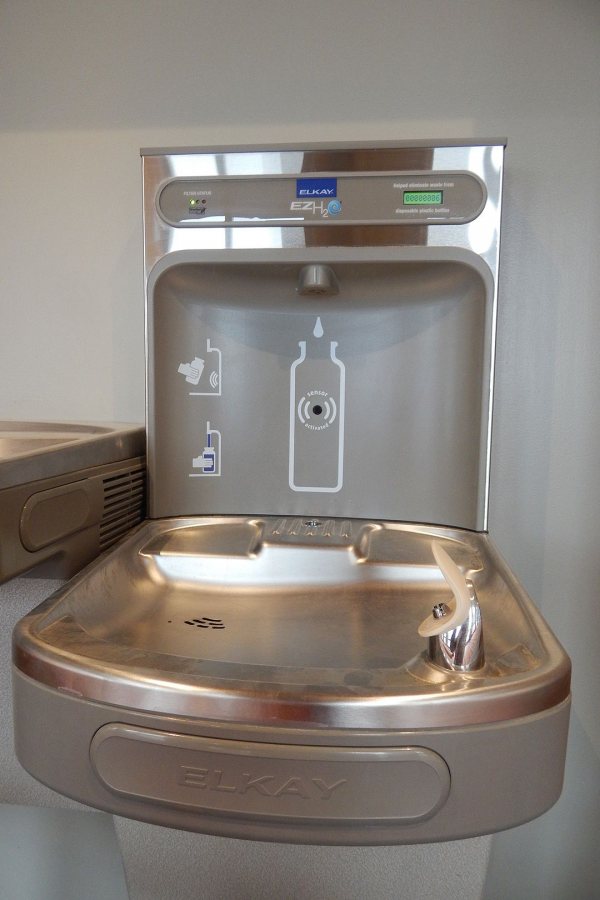
Thanks to a Green Innovation Grant awarded to two members of the physics department, denizens of Carnegie Science Hall will be able to both refill reusable bottles and drink directly at a chilled water station like this Elkay model in Kalperis Hall. (Doug Hubley/Bates College)
Meanwhile, Matt Jadud, Colony Family Professor of Digital and Computational Studies, received a $250 GIG to pilot an open-source energy-sensor project that will tie into the existing network for monitoring the interior warmth of campus buildings. It’s hoped, Twist explains, that Jadud and his students can beat the high cost of commercial sensors.
Finally, two projects take on water issues. Nicole Hastings, assistant in instruction in the physics department, and physics professor John Smedley received a $900 GIG for a water-bottle refilling station in Carnegie Science Hall, as there’s not enough clearance in the sinks and bubblers to fill today’s tall bottles. And Joanna Vollrath ’21 of Menlo Park, Calif., will use about $900 in GIG funds to replace all 60 shower heads in Merrill Gym with high-efficiency models.
One sweet aspect to the Green Innovation Grants, as Twist points out, is that the program itself was paid for by green innovation: The $10,000 annual GIG budget is funded from savings achieved as Bates, under the initiative of energy manager John Rasmussen, has dramatically reduced its energy consumption budget in recent years — from a high of approximately $4 million annually to the current $3 million.
GIG, says Twist, has “been a really successful project, and one that really gives students a lot of momentum in terms of getting their hands dirty and changing the sustainability culture of the campus. We’ll see how it goes, but I think it’s been really effective so far.”
Green Innovation Grants awarded for 2017–18
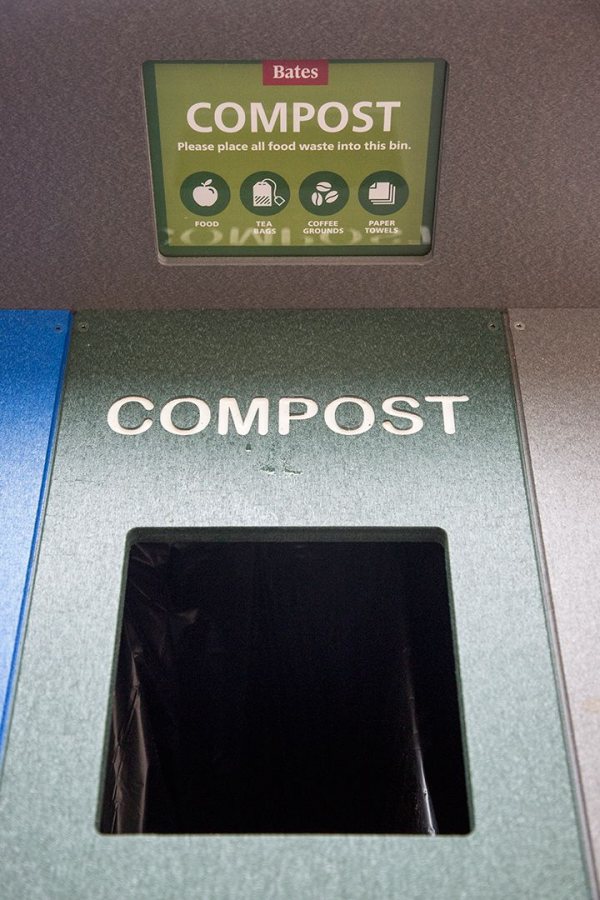
Additional compost collection bins could be stationed around campus as the result of a Green Innovation Grant. (Josh Kuckens/Bates College)
Proposals (two combined): Install high-speed hand dryers in dorms
Submitted by: Olivia LaMarche ’20 and Adair Andre ’18
Amount awarded: $2,000
Goal: Reduce use of paper towels
Proposals (four combined): Expand compost collection (and paper towel recycling) on campus
Submitted by: Lori Larsson, Eileen Messina, Sarah Bernard (staff); Heather Fear (staff); Elizabeth Colcannon ’21; Kenza Nadifi ’21
Amount awarded: $2,000
Goal: Reduce Bates’ waste stream through composting
Proposal: Create new Bates garden
Submitted by: Nell Houde ’18
Amount awarded: $1,885
Goal: Create a sustainable source of fresh produce for Dining Services
Proposal: Replace shower heads in Merrill Gym with low-flow models
Submitted by: Joanna Vollrath ’21
Amount awarded: $900
Goal: Save water
Proposal: Water bottle filling station in Carnegie Science Hall
Submitted by: Nicole Hastings and John Smedley, physics department
Amount awarded: $900
Goal: Reduce use of disposable water bottles and encourage healthy hydration
Proposal: Recycle single-use lab gloves in Dana Chemistry Hall
Submitted by: Bates Chemical Society
Amount awarded: $600
Goal: Reduce disposable gloves going into waste stream
Proposal: Process spent K-Cups through Grounds to Grow On program
Submitted by: Sherry St. Amant, Admission office
Amount awarded: $400
Goal: Improve Admission visitor experience and reduce K-Cups going into waste stream
Proposal: Pilot project for ubiquitous temperature sensing
Submitted by: Matt Jadud, Digital and Computational Studies
Amount awarded: $250
Goal: Create temperature sensors to support campus heating control
